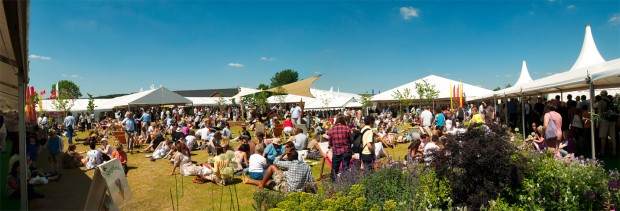You have no items in your cart. Want to get some nice things?
Go shopping
27 is an ominous age: the “27 Club”, of stars including Jim Morrison, Janis Joplin and Amy Winehouse, is one of the most persistent concepts in popular music. However, the Hay Festival of Literature and the Arts enters its 27th year thriving more than ever.
The site of the Hay Festival is arranged as a series of tents, or stages, with covered green walkways leading you between them. Rushing up and down these aisles you might see harried mothers with small children, elderly couples desperately trying not to be mown down by said mothers, Cerys Matthews (formerly of Catatonia) and any number of editors and publicists rushing from stage to stage with author in tow. Choice of footwear is paramount as almost a week of rain has turned the ground to a sea of mud (though I have seen flip flops and various women determined – still – to wear heels).
The biggest queues have been for children’s authors like Anthony Horowitz, or actors such as Benedict Cumberbatch (for whom the teenage girls started forming an orderly line over an hour before his Letters Live event was due to start).
I’ve heard Kenan Malik (the so-called public intellectual) race through 3,000 years of the history of morality, from Homer and the Ancient Greeks through the Middle Ages, the Age of Enlightenment and finally our modern, British society. Particularly good when speaking about the development of morality in relation to the change from polytheistic to monotheistic and finally to secular societies, Malik left us with a vision of humanity continuing to debate and negotiate their own moral codes as communities and social structures continue to develop, and as new forms of discussion and conversation spring up.
From morality to the Secret History of the American Dream, and Sarah Churchwell‘s fascinating account of the first appearances of the phrase and its explosion into common use after 1931. The idea of the American Dream, she argued, was originally invented by James Truslow Adams in response to the widespread inequality he saw, but it soon became lost in ideas of wealth and status as the triumph of the individual overcame any ideals of social responsibility. Today the focus is on material prospects, Churchwell claimed, but when it was first used in the 1930s it was linked with disillusionment.
Notions of American identity gave way to British idiosyncrasies as I listened to Kate Fox speak about her ten-year-old bestseller, Watching the English, which she’s recently revised an updated. An anthropologist who describes herself as a “data junkie”, Fox discussed English “cultural grammar”: what it really means when we bring up the weather in conversation; the unwritten rules of queuing; our “class radar” that’s built on linguistics; our constant readiness for irony. Particularly illuminating on how the use of social media has altered our methods of communication, Fox was a warm and passionate speaker, with a voice reminiscent of Vanessa Redgrave.
Niall Ferguson is also an excellent speaker, slow and measured, clearly giving careful consideration to every word. The First World War has been a popular topic at Hay this year, with Max Hastings, Kate Adie and Margaret Macmillan all speaking on the subject as well as Ferguson. Many drew parallels between the Great War and recent conflicts in the Balkans, Iraq, Afghanistan and the Ukraine, but Ferguson called the British public to task on their opposition to recent conflicts in contrast to their continued justification of the First World War. Calling other historians’ views a “failure of imagination”, Ferguson claimed that Britain was wrong to take military action in 1914 and that the conflict – and the loss of so much human life – could have been avoided. As he concluded, I heard the lady behind me exclaim, “Well, he’s a pugnacious chap, isn’t he?”
It’s possible to spend the day in back-to-back talks, but if you need to give your mind a rest, there are other ways to pass the time: vintage clothes stalls; stands selling everything from fiendishly expensive crockery to artisan ice cream; booths advertising river cruises, independent schools, renewable energy and the RSPB; deck chairs to sit in and read. There’s even a – delicious – brand of apple juice produced specially for the Festival. Just don’t bother trying to connect to the Internet or make any phone calls because nothing works round here; better to leave electronic devices at home, establish a meeting point and rely on pen and paper if you want to take notes. Somehow that seems appropriate.

About Laura Macdougall
Laura Macdougall works as a fiction editor by day. At night she can usually be found at the theatre, a gig or a comedy show. She is particularly interested in new writing and work by emerging female artists.





That was a great depiction for us.